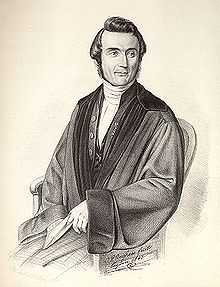Jan Hendrik Scholten

Jan Hendrik Scholten (17 August 1811 – 10 April 1885), Dutch Protestant theologian, was born at Vleuten near Utrecht.
After studying at Utrecht University, he was appointed professor of theology in 1840 at Franeker.[1] From Franeker in 1843 he went to Leiden as professor extraordinarius, and in 1845 was promoted to the rank of ordinarius. Through Scholten, Abraham Kuenen became interested in theology; Scholten was not then the radical theologian he became later. The two scholars in course of time created a movement resembling that of the Tübingen School in Germany. From his theology there "began to rise a different type of spirit, the spirit of absolute antisupernaturalism of the German idealistic kind."[1]
Pursuing first the study of dogmatic theology and the philosophy of religion, Scholten published a work on the Principles of the Theology of the Reformed Church (2 vols, 1848–1850, 4th ed. 1861–1862). He then gave special attention to the New Testament, and wrote A Critical Study of the Gospel of John (1864, in German 1867).
Scholten's other works include:
- Historical and Critical Introduction to the New Testament (1853–1856)
- The Oldest Witnesses to the Writings of the New Testament (1866)
- The Oldest Gospel (1868)
- The Pauline Gospel (1870)
- A Comparative View of Religions
An account of his theological development is given in Afscheidsrede bij het Neerleggen van het Hoogleeraarsambt (1881), and in the biography written by A Kuenen, Levensbericht van J. Henricus Scholten (1885).
Notes
References
 This article incorporates text from a publication now in the public domain: Chisholm, Hugh, ed. (1911). Encyclopædia Britannica (11th ed.). Cambridge University Press.
This article incorporates text from a publication now in the public domain: Chisholm, Hugh, ed. (1911). Encyclopædia Britannica (11th ed.). Cambridge University Press.
|